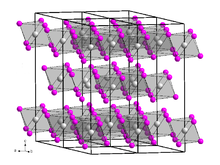Holmium(III) iodide

| |
| Names | |
|---|---|
| Other names
Holmium iodide
Holmium triiodide | |
| Identifiers | |
3D model (JSmol)
|
|
| ECHA InfoCard | 100.034.050 |
| EC Number |
|
PubChem CID
|
|
CompTox Dashboard (EPA)
|
|
| |
| |
| Properties | |
| HoI3 | |
| Molar mass | 545.6437 g/mol |
| Appearance | Pale-yellow solid[1][2] |
| Density | 5.4 g/cm3[3] |
| Melting point | 994 °C[2] |
| Boiling point | 1300 °C[4] |
| soluble in water[2] | |
Except where otherwise noted, data are given for materials in their standard state (at 25 °C [77 °F], 100 kPa).
| |
Holmium(III) iodide is an iodide of holmium, with the chemical formula of HoI3. It is used as a component of metal halide lamps.[5]
Preparation
Holmium(III) iodide can be obtained by directly reacting holmium and iodine:[4]
- 2 Ho + 3 I2 → 2 HoI3
Holmium(III) iodide can also be obtained via the direct reaction between holmium and mercury(II) iodide:
- 2 Ho + 3 HgI2 → 2 HoI3 + 3 Hg
The mercury produced in the reaction can be removed by distillation.[6]
Holmium(III) iodide hydrate can be converted to the anhydrous form by dehydration with a large excess of ammonium iodide (since the compound is prone to hydrolysis).[4]
Properties
Holmium(III) iodide is a highly hygroscopic substance that dissolves in water.[7][3][2] It forms yellow hexagonal crystals with a crystal structure similar to bismuth(III) iodide.[4] In air, it quickly absorbs moisture and forms hydrates. The corresponding oxide iodide is also readily formed at elevated temperature.[4]
References
- ^ Jantsch, G.; Jawurek, H.; Skalla, N.; Gawalowski, H. (1932). "Zur Kenntnis der Halogenide der seltenen Erden. VI. Über die Halogenide der Terbin- und Erbinerdengruppe" [Halides of the rare earths. VI. Halides of the terbium and erbium earth groups]. Zeitschrift für Anorganische und Allgemeine Chemie (in German). 207 (4): 353–367. doi:10.1002/zaac.19322070404.
- ^ a b c d "13635 Holmium(III) iodide, ultra dry, 99.99% (REO)". Alfa Aesar. Retrieved 2022-08-20.
- ^ a b Carl L. Yaws (2015). The Yaws Handbook of Physical Properties for Hydrocarbons and Chemicals. Gulf Professional Publishing. p. 301. ISBN 978-0128011461. Retrieved 2017-08-28.
- ^ a b c d e Georg Brauer (Hrsg.), unter Mitarbeit von Marianne Baudler u. a.: Handbuch der Präparativen Anorganischen Chemie. 3., umgearbeitete Auflage. Band I, Ferdinand Enke, Stuttgart 1975, ISBN 3-432-02328-6, S. 1077.
- ^ Flesch, Peter G. (2007). Light and Light Sources: High-Intensity Discharge Lamps. Springer. p. 45. ISBN 978-3540326854.
- ^ Asprey, L. B.; Keenan, T. K.; Kruse, F. H. (1964). "Preparation and crystal data for lanthanide and actinide triiodides". Inorganic Chemistry. 3 (8): 1137–1141. doi:10.1021/ic50018a015.
- ^ "Holmium triiodide". WebElements. Retrieved 2022-08-20.
